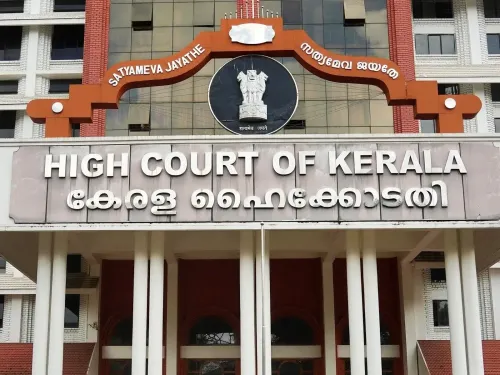Is a Low-Pressure System Over Bay of Bengal Indicating Cyclone Alerts for TN Ports?

Synopsis
Key Takeaways
- Low-pressure system formed over Bay of Bengal.
- Cyclone warnings issued for Tamil Nadu ports.
- Heavy rainfall expected, especially in northeastern districts.
- Precautionary measures implemented at ports.
- Residents urged to follow weather advisories.
Chennai, Aug 20 (NationPress) A low-pressure system has emerged over the west-central and northwest Bay of Bengal, near the northern coasts of Andhra Pradesh and southern Odisha. This development has led the India Meteorological Department (IMD) to issue cyclone warnings for multiple ports in Tamil Nadu.
The IMD anticipates that the system will progress in a west-northwest direction in the coming days.
Consequently, heavy rainfall is expected along the coastlines of Andhra Pradesh and Odisha, while Tamil Nadu, particularly its northeastern districts, is set to experience intermittent showers due to the weather disturbance.
In light of this situation, cyclone warning signal number 1 has been raised at the Nagapattinam port. Similar warnings have been issued for eight other ports: Chennai, Cuddalore, Puducherry, Karaikal, Ennore, Pamban, Kattupalli, and Thoothukudi.
This warning signifies the potential for squally winds and rough sea conditions, leading to strong advisories for fishermen against venturing into the sea until further notice.
Weather experts have warned that even though Tamil Nadu isn't directly impacted by the low-pressure system, its coastal areas will still feel the effects.
The IMD stated, “The system is more concentrated towards northern Andhra and southern Odisha, but Tamil Nadu’s northeastern belt will see spells of rain over the coming days.”
Authorities have started implementing precautionary measures at ports, while district administrations along the coast have been alerted to prepare for heavy rains, potential waterlogging, and gusty winds.
Emergency response teams have been advised to stay on standby.
The IMD is closely monitoring the system's development and movement, with further updates to be provided based on its intensity.
Residents in coastal regions are encouraged to heed weather advisories and follow safety protocols.
This low-pressure system arrives as the southwest monsoon remains active across Tamil Nadu.
Meteorologists suggest that the intersection of monsoon activity and disturbances in the Bay of Bengal could lead to additional rainfall, offering relief from heat but also heightening the risk of local flooding in low-lying areas.









